

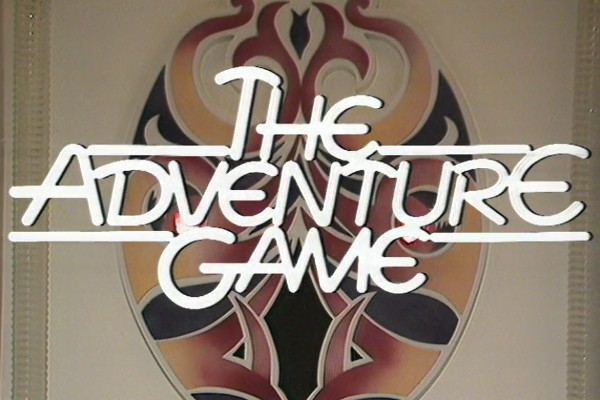
Article originally published March 2017: Updated due to the officially missing episode four being found.
Broadcast during November 1981, available episodes are currently available to buy on DVD from Amazon. In the meantime, please join me as I rank all five episodes from worst to best...
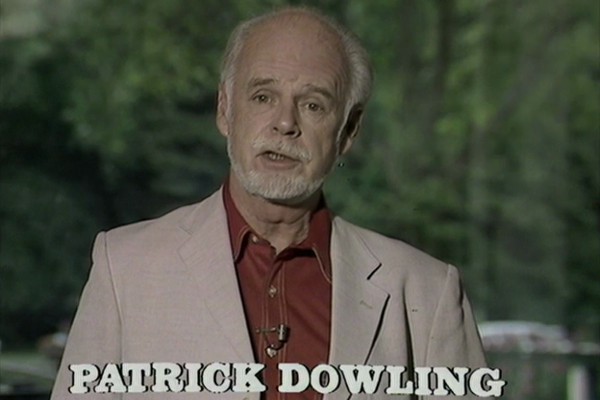
Series two of The Adventure Game is very much a product of old school, middle class BBC. While the third series introduced a backwards-talking, gum-chewing Australian as part of its line-up, series two begins with the incredibly posh series devisor Patrick Dowling introducing the programme while a brass band plays the new theme tune of Edvard Grieg's Norwegian Dance Opus 35 No. 2.
In terms of content, then the series seems a lot cheaper (the Argonds in their alien form are particularly tatty) and there's a lack of innovation present. While some of the affectations, such as space-time trains, are welcome, there's a repetitiveness to most of the games, with each episode containing pretty much identical puzzles for the contestants to solve. The real selling points of the season are the introduction of the Vortex (which claims 9 of 11 possible victims throughout the run) and Lesley Judd as "the Mole".
Sue Cook is the main contestant in this instalment, but in 1981 the Rubik's Cube was such a phenomenon that an aficionado of the puzzle - David Singmaster - could feature as a "celebrity", leaving Philip Sheppard as the sole "member of the public". Cook stands out for two odd moments - telling Charmain that "I think you're getting a bit fat" and then, at the show's climax, she's stranded by a space direction sign and says, possibly as an ad-lib, "wish I'd bought the Hitch-Hiker's Guide to the Galaxy". This is particularly significant as Dowling got his inspiration for the series from both adventure/dice games, and the Douglas Adams SF comedy. Dowling even went so far as to ask Adams to write the series, though scheduling conflicts meant this wasn't possible.
There's also the first mention of Dograns here - "nasty little creatures that creeps up behind you and bites you on the bum" - and, with Singmaster, the first example of a contestant using the gift of a sandwich to predict where the Vortex will be. This is a slightly dry episode, hence the last place ranking, but it's still a lot of fun, and with the concept of the BBC itself sending contestants to an alien planet, the series has the most developed backstory of the lot.
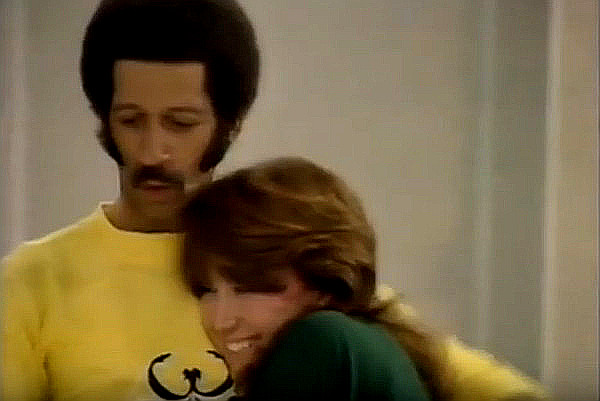
Two episodes of the second series were wiped from the BBC archives and registered as officially missing. While a low-res copy of the second episode was obtained from a private collector and added to the DVD release, episode four was completely missing… until a good quality copy of it mysteriously turned up on YouTube in February 2020.
Where this came from is unknown, as is the fact that it seems to be in a very decent condition, but thanks to this unknown benefactor we finally get to see the escapades of Derek Griffiths, Nerys Hughes, and member of the public Tessa Hamp, an "inscrutable apothecary". Quiet but polite, her husband sadly wrote an obituary for her in a medical site in 2017.
Griffiths is a top tier children's presenter, and will forever be a legend here at The Anorak Zone for his work on Playschool, Bod and Heads and Tails. Sadly he's not in his milder, kid-friendly persona here, but instead bosses people around a little - often with tongue-in-cheek, mind - and at one point demands "one person at a time talk!"
The only contestant to (jokingly) threaten to beat up one of the Argonds, it's very much a reminder of how old this episode is, that it contains Derek calling the women "love", doing a "black knight" gag, and putting on an "Arabic" voice to talk about "the love of Allah". But then a kid's quiz show made 39 years ago wasn't designed to be "woke", and, while the nature of respecting other cultures is to be treasured, this episode exists as a perfect snapshot of the time it was made.
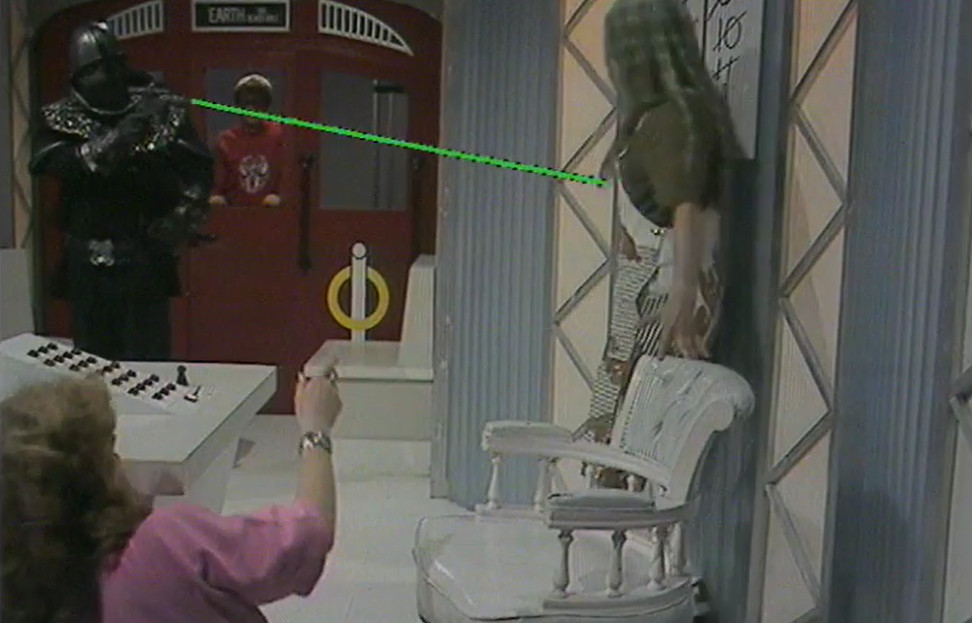
The Adventure Game isn't a particularly expensive series, and the sometimes wobbly cameras or misplaced boom mikes do occasionally add to the charm. The final episode of the series, however, is probably the most amateurish of all purely from a production stand point. Just over five minutes in and a crew member can clearly be seen on camera laying down wiring... ten minutes in and a camera is in shot, while later the Mole game clearly has an edit, with contestants changing places between takes. The contestants enduring such ramshackle surroundings are John Craven, actress Kirsty Miller and Bill Green, an executive who is rather quaintly described as a "conniseur of cornish pasties".
The big flop of series two is a pitch black room, which was developed in later series, but throughout this run has had no other purpose than a room which contestants wander in, only to easily get out the other side. This is somewhat developed here, as for the first time a game is implemented within the room, thus giving it a narrative point - or, at least, that's the way it seemed until the rediscovered episode four showed it also had a purpose for the room.
Later, the dark room is used to trap a member of the "Galactic Police", who turns up to arrest Lesley Judd for being a mole and for unauthorised use of an evaporator. This is one of the strangest turns of events in the whole programme, as Norman Bird's "Captain Acteon" engages in scripted dialogue with the main cast, and the gameshow element is almost forgotten entirely as the series gives way to a sci-fi "drama" presentation for the remaining minutes.
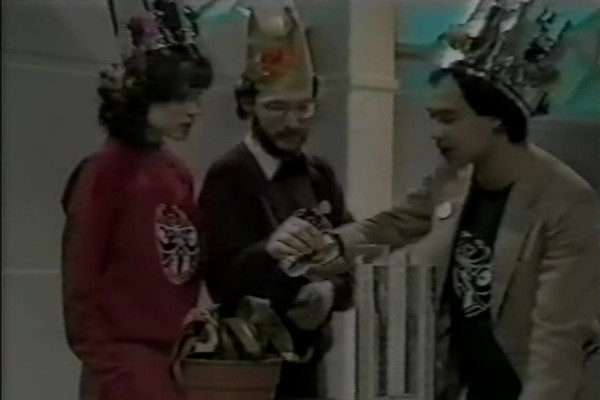
Another episode that is officially missing from the BBC archives, and presented on the DVD release as an off-air recording made by a private collector. As a result, as can be seen by the screen capture above, it's a very low-res condition, but we must be thankful that it exists at all. When the first two seriess were made available through the now-defunct BBC Store, this one wasn't part of the package, though had circulated amongst the show's fans for years, so it must have recently been obtained.
Here actors David Yip and Madeline Smith are joined by member of the public Derek Gale. Yip is likeable, though, upon hearing that a Mole is part of the show, clearly instantly suspects the non-celebrity. A slightly "off" atmosphere makes this one enticing, as Gradwell hurries up Lesley Judd at one point, and also makes scripted remarks about her weight. Smith, meanwhile, starts off well but gets increasingly bossier as the episode goes on...
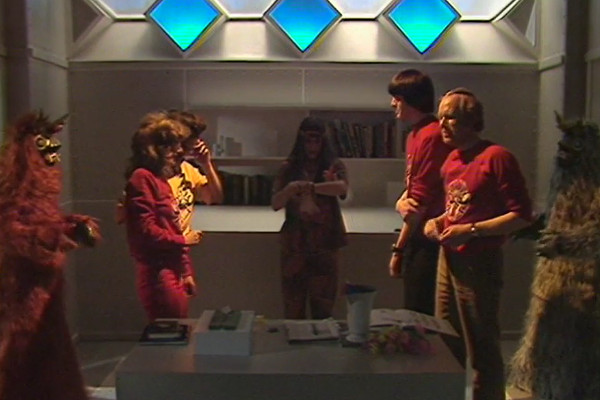
As series two is now nearly 40 years old and each episode lasts 45 minutes, it can naturally drag in places, particularly when contestants struggle unduly with the games and have to be helped along. This is eliminated here with Graeme Garden (here between BBC and ITV series of The Goodies) who is so astoundingly sharp that he almost instantly solves every puzzle. It's a commendable intelligence from a thoroughly likeable contestant, and means that this opener never drags, speeding along on momentum and getting the series off to a great start.
Graeme's amazingly sharp brain picks out Lesley Judd as the Mole almost instantly, though this ultimately proves to be his undoing: as the first contestant to voice suspicion, he immediately brings suspicion upon himself, and, while almost turning it around, is ultimately accused of being the Mole and evaporated. Garden's fellow contestants (presenter Carol Chell and member of the public/Rubik's Cube enthusiast Nicolas Hammond) go on to face the Vortex and fare badly in one of the finest episodes. Lastly, note that Chris Leaver's "deaf old man" routine is revealed here to be an affectation he puts on only when talking to humans.